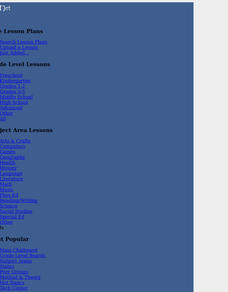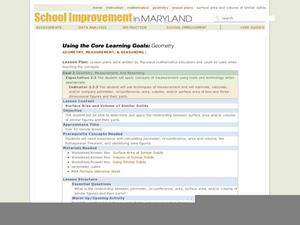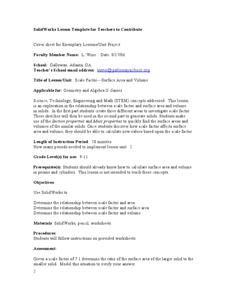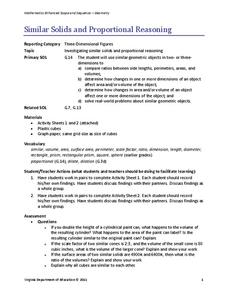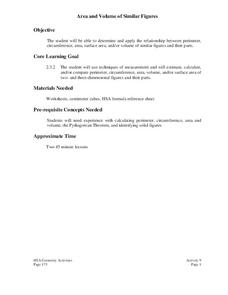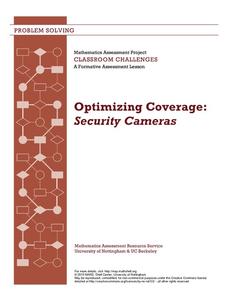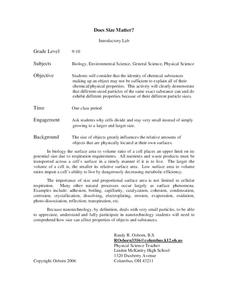Virginia Department of Education
The Ratio of Surface Area to Volume
Demonstrate the ratio of surface area to volume in your high school class by using phenolphthalein, gelatin, and an onion. Intrigue the class by leading a discussion on osmosis and diffusion, then making "scientific jello." Participants...
Digital Lesson
Cereal Box Surface Area
How much math can your learners pour out of a cereal box? Your middle schoolers will explore their favorite cereal and calculate the surface area, volume, and weight ratios and log this information on the provided worksheet. They get to...
Alabama Learning Exchange
How Big Can a Bee Be?
Mathematicians analyze the relationships between surface area and volume. They conduct Internet research, conduct various experiments, record the data in a spreadsheet, and graph the results and compare the rate of increase of surface...
Curated OER
Surface to Volume Ratios
Students measure the rate of diffusion and to calculate the surface area to volume ratios of varying cell sizes. The lesson plan is very clearly organized with a useful student worksheet provided. They perform a lab experiment which is...
Curated OER
Surface Area to Volume Ratio
Students examine the surface area to volume ratio and how they relate. In this surface area lesson students complete several activities.
Nuffield Foundation
Effect of Size on Uptake by Diffusion
Cell size is limited by the surface area to volume ratio, but why is this true? Scholars measure the surface area and volume of cubes before placing them into liquid. After a set amount of time, they measure the uptake by diffusion for...
Purdue University
Plastic Water Bottle Design – What’s the Best Shape?
Join the fight to reduce plastic waste. A hands-on STEM activity first teaches scholars about the scourge of plastic waste. They then measure the dimensions of water bottles to calculate surface areas and volumes before using the surface...
Curated OER
Volume and Surface Area
Students explore volume and surface area. In this math instructional activity, students fill boxes with cubes to identify the volume of the boxes. Students discuss area.
Curated OER
Surface Area and Volume of Similar Solids
Students explore similar figures. In this surface area and volume lesson, students identify the relationship between the surface area and volume of similar figures.
Curated OER
Scale Factor- Surface Area and Volume
Students calculate the surface area and volume of shapes. For this geometry lesson, students create different scales and calculate the volume and area for each shape. They compare and contrast between the different scales and shapes.
Curated OER
Surface Area and Measuring
Tenth graders explore volume and surface area through percentages. In this geometry lesson, 10th graders analyze the surface area of two and three dimensional shapes, then use percents and ratio to compare the two.
Curated OER
Sizing Cells
Young scholars examine how living cells reproduce to make new cells. In this cell reproduction lesson students complete a lab activity and answer questions.
Teach Engineering
Discovering Relationships Between Side Length and Area
Consider the relationship between side length and area as an input-output function. Scholars create input-output tables for the area of squares to determine an equation in the first installment of a three-part unit. Ditto for the area of...
Virginia Department of Education
Similar Solids and Proportional Reasoning
Double the dimensions, quadruple the surface area. Pairs build similar prisms and compare the ratios of their surface areas and volumes to the ratio of the heights. Given two similar cones, partners determine the ratios of the lateral...
Curated OER
SA/V Ratio and Rate of Diffusion
Students calculate the SA/V ratio and volume of phenophthalien agar that are cut into different shapes. They then let ammonia diffuse into the various pieces of agar and determine the effect that SA/V had on the rate of diffusion.
University of Nottingham
Drawing to Scale: A Garden
See how design and geometry go hand in hand. The activity asks learners to use geometry to design a backyard garden given dimensions of each feature. Scholars work with ratios and scale to develop an accurate scale drawing that includes...
Curated OER
Perimeter and Area of Similar Figures
Learners determine the relationship between perimeter, circumference, area, surface area, and/or volume of similar figures and their parts. They complete activities related to the question. Answer key included.
Curated OER
Cell Replication
Students use Internet activities and videos to understand the types of cells, their membranes, and the way that they reproduce. In this cellular biology lesson, students use the Internet to view videos and complete activities. They...
Willow Tree
Measurement
Build a basic understanding of units of measure and create a great foundation for your learners. The lesson gives a complete overview of everything measurement, from types of measurement to rounding to conversions — it has it all!
Curated OER
Exploring Similarity Using Scale Drawings
Learners explore scale factor as they create a scale drawing of a box, then determine the surface area and volume of the original and the scale drawing. The one page worksheet contains activities and procedures with four questions.
Mathematics Assessment Project
Optimizing Coverage: Security Cameras
Are you being watched? Class members determine where to place security cameras protecting a shop. They then evaluate their own and several provided solutions.
Curated OER
Does Size Matter?
Students explore the surface area to volume ratio in cellular respiration. While participating in an interactive lab experiment, they examine proportional surface area and discuss nanotechnology. Students observe the effectiveness of...
Curated OER
Who Wants to Carry a Million?
Students, in groups, determine the volume of a box large enough to hold a million dollars. They calculate the dimensions of a bill and the volume of the money.
Curated OER
How Does Cell Size And Shape Affect Transport of Materials
Tenth graders explore concepts of surface area, volume, and ratios, create spreadsheets to aid organization of data collected and provide graphing capabilities, and use NIH Imaging to enable calculations of microscopic organisms.





